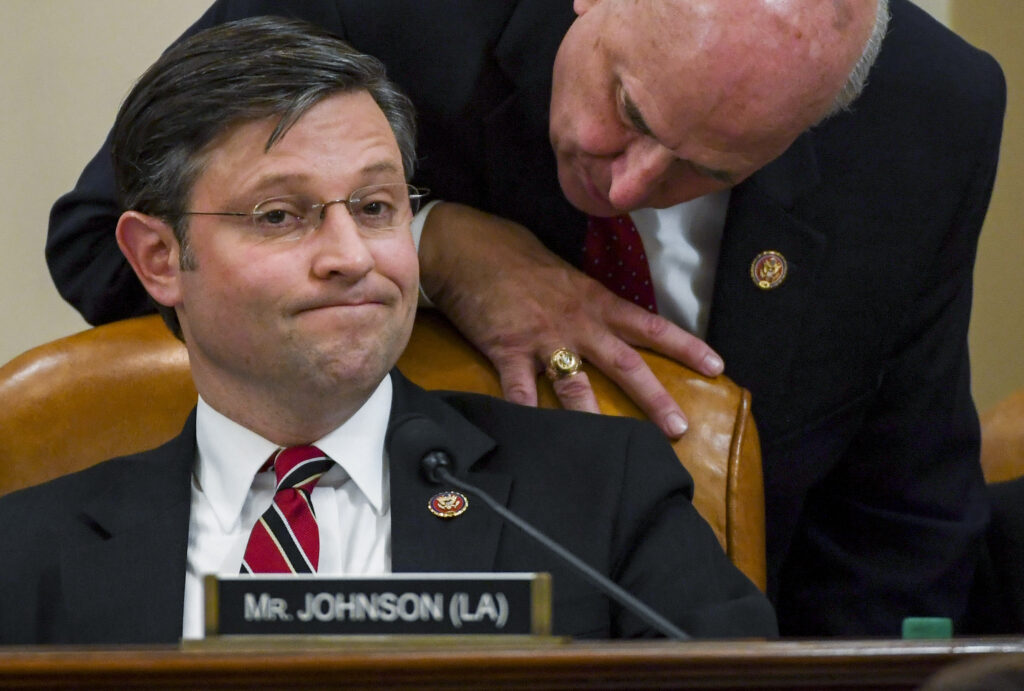Election Denier Rep. Mike Johnson Wins House Speakership After Weeks of Dysfunction
WASHINGTON, D.C. — Three weeks ago, the U.S. House of Representatives ousted former Speaker Kevin McCarthy (R-Calif.), the first time the House has ever removed its leader. After scrambling for 23 days, House Republicans have finally elected Rep. Mike Johnson (R-La.), vice chair of the House Republican Conference, as their new speaker.
The little-known representative from Louisiana secured 220 votes, more than the necessary 217, to take the speaker’s gavel after rounds of Republican conference votes, numerous failed nominees and nearly a month of dysfunctional governance. Prior failed speaker nominees included Rep. Jim Jordan (R-Ohio), one of the most far-right members of Congress, and Rep. Tom Emmer (R-Minn.), who was not far-right enough for the most extreme members of the GOP caucus.

Johnson — who served on former President Donald Trump’s first impeachment defense team and has been a staunch Trump supporter — was instrumental in the effort to overturn the 2020 presidential election. During the post-election legal effort, in which the Trump campaign filed over 60 lawsuits and lost all but one of them, Johnson circulated an email asking his colleagues to sign onto a “friend-of-the-court” (amicus) brief supporting the state of Texas’ lawsuit asking the U.S. Supreme Court to decertify the election results in four key states: Georgia, Michigan, Pennsylvania and Wisconsin.
Over 100 House Republicans — including most of the speaker nominees — signed the brief. Just four days after the lawsuit was filed, the Supreme Court rejected their request.
Johnson’s election denialism continued into the congressional certification of the Electoral College. Laying the groundwork for 139 House Republicans, including himself, to vote against certifying the election on Jan. 6, 2021, Johnson argued that since certain key states implemented mail-in voting policies without legislative approval, those changes were unconstitutional and their election results were invalid. (Many states made emergency changes to election rules and expanded mail-in voting opportunities amidst the COVID-19 pandemic.)
Johnson’s claim, which heavily relies on a fringe and now-rejected legal theory known as the independent state legislature (ISL) theory, was echoed throughout the infamous Jan. 6 memo written by former Trump lawyer John Eastman, who not only faces disbarment proceedings, but has been indicted by a Fulton County grand jury for his efforts to subvert democracy in Georgia. Over the summer, the Supreme Court rejected the ISL theory in Moore v. Harper.
Not only did Johnson support Trump’s unfounded legal basis to challenge the 2020 election and disenfranchise 20 million voters across those four key states, he has also opposed meaningful voting rights legislation and fair maps. He voted for a sweeping voter suppression bill rooted in conspiracy theories, voted against recent federal voting rights legislation like the For The People Act and John R. Lewis Voting Rights Advancement Act and defended Louisiana against having to draw a second majority-Black congressional district.
In 2020, he led the House’s effort to overturn the election and now he leads the House as speaker — a reminder of how Trump and his election denying allies have become mainstream in the Republican Party.